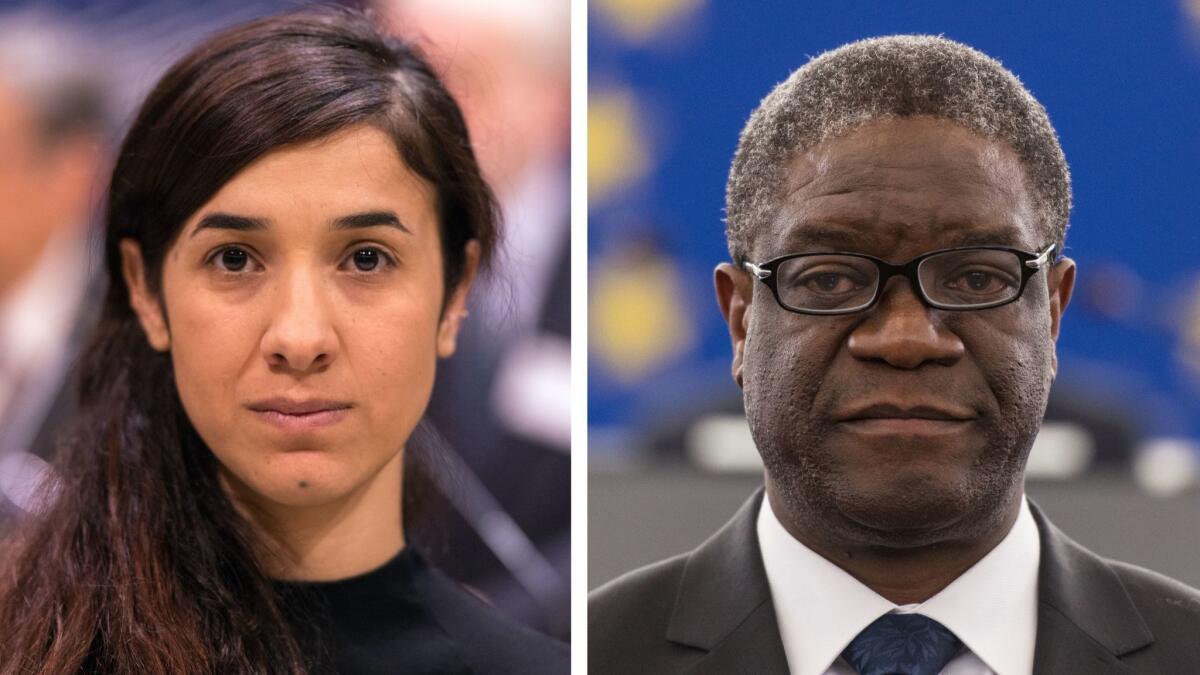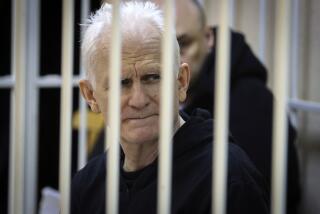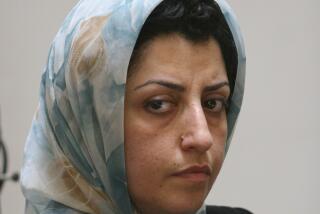Nobel Peace Prize winners Nadia Murad and Denis Mukwege work to end sexual violence against women

The Nobel Peace Prize was awarded Friday to a former sex slave in Iraq and a doctor in Congo working to halt systematic rape in some of the world’s worst conflict zones at a time of increasing global awareness of abuse against women.
The prize went to Nadia Murad, an Iraqi Yazidi who was enslaved in 2014 by Islamic State extremists before escaping and becoming a United Nations advocate against sexual assault, and Dr. Denis Mukwege, a gynecologist from the conflict-riven Democratic Republic of Congo who treats victims of sexual violence. Each has faced life-threatening risks.
“Both laureates have made a crucial contribution to focusing attention on, and combating, such war crimes,” the Norwegian Nobel Committee said in its statement announcing the award. “Each of them in their own way has helped to give greater visibility to war-time sexual violence, so that the perpetrators can be held accountable for their actions.”
Rape and sexual abuse are often used as strategic tools of war by soldiers against noncombatants such as women and children. The victims may be singled out for their ethnic, racial or political identities and have little access to justice.
“We want to send out a message of awareness, that women who constitute half the population in most communities actually are used as a weapon of war, and that they need protection, and that the perpetrators have to be prosecuted and held responsible for their actions,” said Berit Reiss-Andersen, committee chairwoman, in a televised news conference.
The Nobel committee’s decision came a year after investigative journalists published allegations of sexual assault and harassment by Hollywood mogul Harvey Weinstein, which intensified attention paid to sexual abuse in — among other settings — corporate offices, at high school parties and in lawless war zones.
Those locales might not otherwise have a lot in common. But a consistent theme of the #MeToo movement has been to raise awareness about the prevalence of sexual violence and predation, and also to highlight the impunity of perpetrators — a consistent theme of Mukwege’s and Murad’s stories.
“#MeToo and war crimes is not quite the same thing, but they do, however, have in common that it is important to see the suffering of women,” Reiss-Andersen said.
A U.N. report this year on sexual violence in conflict zones noted that “despite the increased awareness of the issue, most incidents of mass rape continue to be met with mass impunity.”
Murad, 25, is Yazidi, an ethnic and religious minority in northern Iraq that suffered some of the worst abuses of Islamic State during the radical group’s dramatic expansion in 2014.
Hundreds of Murad’s fellow villagers were slaughtered, and Murad — along with thousands of other Yazidi women — was captured, kept as a slave, raped repeatedly and threatened with execution unless she converted to Islam.
Murad later recounted the horror of her experience in a book, “The Last Girl,” describing in personal terms how Islamic State had used rape to subjugate women and girls, not just physically, but psychologically.
“At some point, there was rape and nothing else,” Murad wrote. “You stop thinking about escaping or seeing your family again. Your past life becomes a distant memory, like a dream. Your body doesn’t belong to you, and there’s no energy to talk or to fight or to think about the world outside. There is only rape and the numbness that comes with accepting that this is now your life.”
After three months in captivity, Murad escaped, and her advocacy began. In 2016, she became U.N. goodwill ambassador for the dignity of survivors of human trafficking, and like many other women, she has publicly told her traumatic story to raise visibility for others.
Murad responded to Friday’s prize by turning the spotlight back toward Yazidi women and children who are still being held in captivity.
“Persecution of minorities must end,” Murad said in a statement. “We must work together with determination — to prove that genocidal campaigns will not only fail, but lead to accountability for the perpetrators and justice for the survivors.
“We must remain committed to rebuilding communities ravaged by genocide,” she said. “Survivors deserve a safe and secure pathway home or safe passage elsewhere.”
Mukwege, 63, has treated tens of thousands of sexual assault victims over the last two decades at the Panzi Hospital in Bukavu, Congo, where long-running internal strife has left millions of Congolese dead since the turn of the century.
Many of Mukwege’s patients are victims of the conflict. When war broke out two decades ago, 35 of his patients were killed in their beds, which led him to flee. In 1999, he saw his first rape victim from the war, who had also been shot in her genitals and thighs. Soon, he began to see more horrific injuries, along with evidence of systematic abuses.
“I started to ask myself what was going on,” Mukwege wrote in a column for the BBC in 2013. “These weren’t just violent acts of war, but part of a strategy. You had situations where multiple people were raped at the same time, publicly…. The result of this strategy is that people are forced to flee their villages, abandon their fields, their resources, everything. It’s very effective.”
The systematic abuses led Mukwege to turn to international activism to denounce the impunity of the perpetrators and the ineffectiveness of the Congolese government, which, in turn, elevated the danger against Mukwege himself.
In 2012, Mukwege and his family barely survived being kidnapped at gunpoint after armed men invaded his home, killing one of Mukwege’s security guards.
But Mukwege refused to stay away. When Friday’s award was announced, he was in the middle of performing surgery at his hospital.
“For almost 20 years I have witnessed war crimes committed against women, girls, and even baby girls not only in my country, the Democratic Republic of Congo, but also in many other countries,” Mukwege said in a statement accepting the honor.
“To the survivors from all over the world, I would like to tell you that through this prize, the world is listening to you and refusing to remain indifferent,” Mukwege said. “The world refuses to sit idly in the face of your suffering.”
Twitter: @mattdpearce
More to Read
Sign up for Essential California
The most important California stories and recommendations in your inbox every morning.
You may occasionally receive promotional content from the Los Angeles Times.











